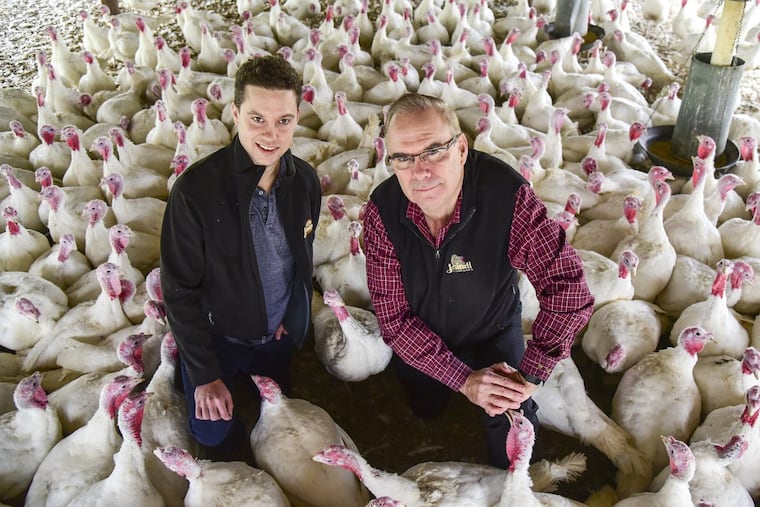Turkey farmer Jaindl counts his birds well before they're hatched
Maybe David Jaindl didn't get the memo, the one about not counting your poultry… Raising turkeys is a high-stakes gamble, with decisions about Thanksgiving 2018 made a year in advance. And here's a fun fact: Turkeys eat three pounds of feed to produce one pound of meat. At the height of the season, Jaindl's 750,000 turkeys eat 1,400 tons of feed a week.

Don't count your chickens before they're hatched. Everyone knows that rule.
David Jaindl, 61, obviously didn't get the memo, or maybe it doesn't apply to turkeys. Or maybe it's why agriculture is such a high-stress business.
"I'm making the decision for next Thanksgiving today," said Jaindl, owner and president of Jaindl Farms LLC. His family-owned turkey farm near Allentown will sell 825,000 birds by the end of the year, based on a decision last year to up production from 750,000 birds.
(By the way, for the last 40 years, Jaindl's birds have been shipped to the White House for Thanksgiving. President Barack Obama wanted Jaindl's organic bird; President Trump will be getting two.)
Now, "we're making a calculated decision on how many breeders to keep and then how many turkeys to grow for next year," he said. But "we won't know exactly what we're going to need for next year until next year."
Jaindl's counting-your-birds-before-they're-hatched decision involves how many breeders to keep off the turkey-processing line. The turkey mamas move into a breeding farm, where they have a controlled atmosphere with additional lighting. In late January and February, they begin hatching future Thanksgiving centerpieces. Once the birds are born, they move into different barns.
"Then the turkey takes anywhere from 18 to 32 weeks to grow out and ready for processing," Jaindl said. Customers include Whole Foods, and each year, he said, Jaindl's sells out of birds.
Explain some of the factors in your decision-making.
You look at your traditional customers. We have six or seven large customers that are with us each year. You look at the way they're trending. You extrapolate through that. Then, of course, we had a tremendous number of new customers last year we had to turn away. We have one of our larger customers who increased his order significantly this year, which was good for us.
Lucky you. Demand for your product is increasing. Yet you say you plan to cut production next year back to 750,000.
We're going to go back to 750,000 because to expand by more than 750,000, we [learned] that we'd have to expand the buildings. We have plenty of land. We just need more buildings. We self-finance, so financing is not an issue.
So why not expand?
I guess you have no clue on what the process is for land development. Government regulations. The approvals, and the effort to take these things through the process is astronomical — expense, time and effort. The bang is not worth the effort.
But besides being a farmer, you’re in the land-development business. This isn’t new to you.
To be ready for next year with the construction, we should have started three years ago. I don't know what the turkey business is going to provide in three years. I always ask my interviewers if they ever grew up on a farm, because you really need to understand agriculture to understand the trials and tribulations. It's tough. So yes, we have the market. We could probably sell a million turkeys a year. But selling a million turkeys a year and doing it the way you want to do it, in the manner you want to do it, are two different things. It's not only about expanding. It's not only the government regulations, about getting the approvals for the buildings. It's not only about that, but it's also about the risks that are taken with more capacity of the operation. It's just a tremendous amount of risk.
Like what?
It's the weather and the health of the birds. Our turkeys are very healthy, but there's tremendous risk. For example, avian influenza was a problem in the Midwest a couple of years ago, and the poor farmers, it drove them out of business.
Is that why you diversify? You own Schantz’s orchards, and you grow grain. You bought A-Treat soda, an iconic Lehigh Valley brand. Plus, you plan to convert the 124,000-square-foot Mary Immaculate seminary in Lehigh Township into a wedding venue and hotel.
Yes. We have about 40 different projects going on at all times.
The Jaindl’s enterprise started when your grandfather bought your father five turkeys at a county fair. Your father passed it to you, and now all five of your children are involved.
There's enough diversity in the business between the agriculture in the orchards, between the turkeys and the grain farm, land development and hospitality, that there's enough for everybody. There's enough responsibility to go around.
DAVID M. JAINDL.
Title: Owner and president of Jaindl Farms LLC, Jaindl Land Co., Schantz Orchards, Jaindl Beverage (A-Treat), Hitters Edge.
Home: On the turkey farm in Orefield, near Allentown.
Family: Wife, Jackie; children, Adam, 31; Jacob, 28; Luke, 26; Josh, 24; Joanna, 22.
TALKING TURKEY.
Sex: 2,000 to 2,500 tom turkeys inseminate 20,000 to 25,000 hen turkeys, with each hen inseminated once every seven days.
Birth: The hens lay a total of 14,000 eggs a day, producing 32 poults per hen.
Turkey home: 2.5 million square feet in 219 barns with some feed grown on Jaindl's 160 grain farms.
Dinner: At the height of the season, the turkeys eat 1,400 tons of feed a week.
And in the end: Jaindl's plant can process 20,000 turkeys a day.
Employees: 150 in the growing season.